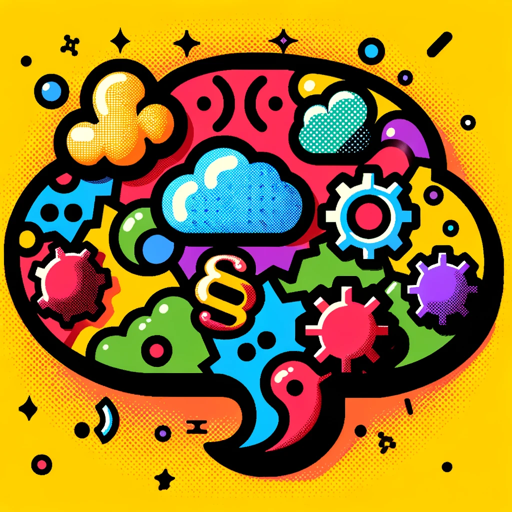Whitehead's Philosophy of Organism-detailed guide to Whitehead.
AI-powered guide to Whitehead's philosophy.
Explain Whitehead's concept of concrescence.
Where does Whitehead discuss the nature of consciousness?
Define Whitehead's term prehension.
Summarize Whitehead's view on the relation between mind and matter.
Related Tools
Load More
Philosophy Sage
Philosophy and critical thinking expert, adept in various philosophical topics.
第一性原理思考
这是李继刚(即刻同名)创作的第一性原理思考的 Bot。 它擅长从万物基本原理和常识出发, 推演做事思路。请直接提出你的问题,且看它如何应手。

Philosophy
🔷#𝟏 𝐏𝐞𝐫𝐬𝐨𝐧𝐚𝐥𝐢𝐳𝐞𝐝 𝐏𝐡𝐢𝐥𝐨𝐬𝐨𝐩𝐡𝐲 𝐓𝐮𝐭𝐨𝐫🔷

Explore Philosophy (Philosophy Tutor)
Got a hot take? This GPT surveys the history of philosophy and brings you good (and bad) arguments for nearly any opinion!

Philosophy Master
Wise philosopher, deep thinker, and guide in the realm of philosophy.

Gödel's Phenomena Analyst
An inquisitive researcher linking mysteries to science. Member of the Hipster Energy Team. https://hipster.energy/team
20.0 / 5 (200 votes)
Introduction to Whitehead's Philosophy of Organism
Whitehead's Philosophy of Organism, also known as Process Philosophy, is a metaphysical framework that emphasizes the fundamental interrelatedness and dynamic nature of reality. Whitehead postulates that reality is composed of processes rather than static substances. This framework is designed to account for the continuity of experience and the interconnection of all entities. For example, in Whitehead's view, an apple is not just an isolated object but a process involving growth, change, and interaction with its environment. This philosophy contrasts with the classical notion of substances, which sees entities as static and independent.

Main Functions of Whitehead's Philosophy of Organism
Analytical Tool
Example
Whitehead's framework can be used to analyze complex systems in nature and society by focusing on processes and relationships rather than static entities.
Scenario
In environmental science, researchers can use this approach to understand ecosystems as dynamic processes involving interactions among organisms and their environment.
Philosophical Framework
Example
It offers a comprehensive metaphysical system that integrates science, ethics, and aesthetics.
Scenario
Philosophers and theologians can apply Whitehead's ideas to develop an integrated worldview that addresses both scientific understanding and moral values.
Educational Methodology
Example
Whitehead's emphasis on the interconnectedness of knowledge can influence educational practices.
Scenario
Educators might design interdisciplinary curricula that reflect the interconnected nature of different subjects, encouraging students to see the links between science, art, and ethics.
Ideal Users of Whitehead's Philosophy of Organism
Philosophers and Theologians
These individuals can use Whitehead's framework to explore and integrate various aspects of reality, including metaphysical, ethical, and theological dimensions.
Scientists and Researchers
Scientists in fields like ecology, biology, and social sciences can benefit from this process-oriented approach to understand the dynamic interactions in complex systems.
Educators and Curriculum Developers
Educators can use Whitehead's ideas to design curricula that emphasize the interconnectedness of different fields of knowledge, fostering a holistic educational experience.

How to Use Whitehead's Philosophy of Organism
Visit aichatonline.org for a free trial without login, also no need for ChatGPT Plus.
Start by accessing the platform to get immediate access without any financial commitment or the need for an upgraded account.
Prepare your questions or research topics.
Identify specific inquiries or topics related to Whitehead's philosophy that you wish to explore. This could range from understanding key concepts to applying his ideas in various contexts.
Utilize the search function for targeted information.
Use the tool’s search capabilities to find detailed explanations, quotes, and analyses from Whitehead’s works. This ensures precise and relevant information.
Engage with detailed responses and examples.
Review the comprehensive answers provided. The tool draws directly from Whitehead’s texts, ensuring depth and accuracy in the explanations.
Apply insights to your academic or personal projects.
Use the gathered information to enhance your understanding, write papers, or apply Whitehead’s philosophy to practical scenarios. The tool’s detailed responses are designed to support thorough academic and practical application.
Try other advanced and practical GPTs
LUA Expert Code Creator
AI-powered Lua script assistance for Roblox developers.

GPT Teacher
AI-Powered Interactive Learning Tool

Retro Adventures
AI-Powered Retro Pixel Art Adventures

DriveGPT
AI-Powered Driving Guidance and Simulation

DSA and SQL GPT
AI-Powered Learning for DSA and SQL

Web Quality Analyst
AI-powered web quality evaluation

妄想くん
Transforming images into imaginative stories
GPT API Assistant Cir 11 8 23
Optimize your API integration with AI-powered precision

Manga Master
AI-Powered Manga Creation Assistance

TranshumanGPT
Empowering the Future with AI

A.I. Lovecraft
Explore the unknown with AI's dark wisdom.

Prompt Master
AI-powered prompt optimization for enhanced results.

- Academic Research
- Philosophical Inquiry
- Concept Analysis
- Process Understanding
- Scientific Application
Q&A about Whitehead's Philosophy of Organism
What is the primary focus of Whitehead's Philosophy of Organism?
Whitehead's Philosophy of Organism centers on the idea that reality is composed of processes rather than static entities. This perspective emphasizes the interconnectedness and dynamic nature of all things, highlighting the importance of relationships and change over time.
How does Whitehead define the concept of 'prehension'?
In Whitehead’s philosophy, 'prehension' refers to the process by which an entity incorporates aspects of other entities into itself. This process involves both 'positive prehension' (where elements are integrated) and 'negative prehension' (where elements are excluded), facilitating the complex interrelations that constitute reality.
What role does 'eternal objects' play in Whitehead's metaphysics?
'Eternal objects' in Whitehead’s framework are abstract forms or potentials that can be realized in the actual world. They are timeless entities that provide the patterns or possibilities that actual entities can instantiate, contributing to the diversity and richness of experiences in the universe.
Can Whitehead's philosophy be applied to modern scientific contexts?
Yes, Whitehead’s philosophy offers a valuable framework for understanding scientific phenomena. His emphasis on processes and interconnections aligns well with contemporary scientific views on complexity, quantum mechanics, and evolutionary biology, providing a holistic perspective that complements detailed empirical studies.
How does Whitehead's view of reality differ from traditional metaphysics?
Traditional metaphysics often focuses on static substances and fixed properties. In contrast, Whitehead’s metaphysics is dynamic, emphasizing becoming, change, and the relational nature of existence. This shift from static being to dynamic becoming represents a significant departure from classical metaphysical views.